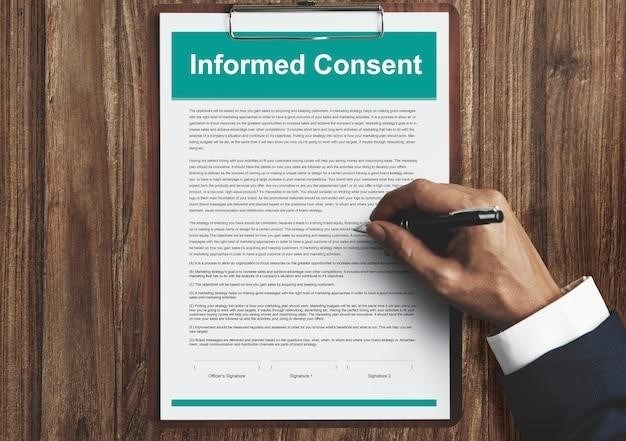3-Day Right to Cancel Contract in California
California law grants consumers a three-day right to cancel certain contracts, known as a “cooling-off” period․ This right applies to contracts for home improvement, solar energy, and other specific types of services, giving consumers the opportunity to reconsider their decisions before being legally bound․ To exercise this right, consumers must send a written cancellation notice to the contractor within three business days of signing the contract․ This notice must be in writing and include specific information, such as the date the contract was signed and the name of the contractor․ The 3-day right to cancel is a valuable consumer protection that ensures individuals have time to make informed decisions about their contracts․
Overview of the Right to Cancel
California’s 3-day right to cancel, formally known as the right of rescission, is a consumer protection law that allows individuals to terminate certain contracts within three business days of signing them․ This right provides consumers with a “cooling-off” period to reconsider their decisions and avoid entering into agreements they may later regret․ The right to cancel applies to specific types of contracts, primarily those involving home improvement, solar energy systems, and other services performed at the consumer’s residence․ This right is designed to protect consumers from high-pressure sales tactics and ensure they have adequate time to review the contract’s terms and conditions before becoming legally bound․
The 3-day right to cancel is a powerful tool for consumers․ It allows them to cancel contracts for any reason, without penalty or obligation․ Consumers need to send a written cancellation notice to the contractor within the designated three-business-day period․ This notice must be in writing and include specific information, such as the date the contract was signed and the name of the contractor․ Failure to provide this notice within the allotted timeframe may result in the loss of the right to cancel․
While the 3-day right to cancel is a valuable consumer protection, it’s crucial to understand its limitations․ It does not apply to all contracts, and there are specific exceptions that may prevent consumers from exercising this right․ It’s essential to carefully review the contract’s terms and conditions to determine if the 3-day right to cancel applies․ If you have any doubts or questions, consulting a legal professional is always advisable․
Types of Contracts Subject to the 3-Day Right
California’s 3-day right to cancel applies to a specific range of contracts, primarily those involving home improvement, solar energy systems, and other services performed at the consumer’s residence․ This right aims to protect consumers from high-pressure sales tactics and ensure they have sufficient time to review the contract’s terms and conditions before being legally bound․ The types of contracts subject to the 3-day right to cancel are outlined in California Civil Code sections 1689․5, 1689․6, and 1689․7, which provide detailed information about the specific transactions covered․
Home improvement contracts are a prime example․ This includes contracts for work on a homeowner’s residence, such as roofing, siding, windows, and landscaping․ Similarly, contracts for solar energy systems, including installation and maintenance, are subject to the 3-day right to cancel․ Additionally, contracts for certain types of restoration work, such as repairs after a natural disaster, may fall under this right․ The 3-day right to cancel also applies to contracts for services performed at the consumer’s residence, such as home repairs or maintenance, and those involving the sale of goods, including certain appliances and electronic products․
It’s important to note that not all contracts involving home improvement, solar energy, or restoration work are subject to the 3-day right to cancel․ Certain exceptions may apply, such as contracts for emergency repairs or those involving work that is completed within 24 hours․ Consumers are encouraged to carefully review the contract’s terms and conditions to determine if the 3-day right to cancel applies․ Consulting a legal professional can also provide clarity and guidance on the specific circumstances of each contract․
How to Cancel a Contract
Exercising your 3-day right to cancel in California requires a clear and concise written notice sent to the contractor within the designated timeframe․ The notice must be delivered in person or via certified mail, ensuring a record of delivery․ You can find a sample cancellation form on the California Department of Consumer Affairs website, which provides a template for the required information․ However, it’s essential to ensure your notice includes the following key elements⁚
Your Name and Address⁚ Clearly state your full name and current mailing address․
Contract Date and Contractor Name⁚ Specify the date you signed the contract and the full name of the contractor․
Contract Description⁚ Briefly describe the services or goods covered by the contract․
Cancellation Intent⁚ State your clear intention to cancel the contract, citing your right under California law․
Signature and Date⁚ Sign and date the notice, making sure it’s legible and easily identifiable․
Delivery Method⁚ Send the notice via certified mail, requesting a return receipt, or deliver it in person with a signed receipt from the contractor․
It’s advisable to keep a copy of the cancellation notice for your records․ If you’re unsure about the proper format or content of the notice, seeking legal advice from a qualified attorney can ensure your cancellation is valid and effective․
Content of the Cancellation Notice
The cancellation notice you send must clearly communicate your intention to cancel the contract and adhere to California law’s specific requirements․ It must contain the following essential information⁚
Your Name and Address⁚ Clearly state your full name and current mailing address․
Contract Date and Contractor Name⁚ Specify the date you signed the contract and the full name of the contractor․
Contract Description⁚ Briefly describe the services or goods covered by the contract․
Cancellation Intent⁚ State your clear intention to cancel the contract, citing your right under California law․
Signature and Date⁚ Sign and date the notice, making sure it’s legible and easily identifiable․
While a specific format isn’t mandated, the notice should be written in plain language, avoiding technical jargon․ It’s crucial to avoid any ambiguity or vagueness in your statement․
For instance, instead of simply stating “I cancel this contract,” you can say⁚ “I hereby cancel the home improvement contract dated [Date] signed between myself and [Contractor Name], for services related to [Brief Description of Services]․ I am exercising my right to cancel under California law․”

Exceptions to the 3-Day Right
While the 3-day right to cancel is generally applicable to home improvement, solar energy, and certain other contracts, there are specific exceptions where this right doesn’t apply․ These exceptions are designed to address situations where immediate action is necessary or where the nature of the contract doesn’t lend itself to a cooling-off period․ Some common exceptions include⁚

Emergency Situations⁚ If an emergency situation, like a roof collapse or severe damage, necessitates immediate repairs, the 3-day right to cancel may be waived․ However, the waiver must be in writing, signed and dated by the homeowner, and specifically state the emergency situation․
Contracts for Purchase of a Home⁚ The 3-day right to cancel generally doesn’t apply to contracts for the purchase of a home․ This is because such transactions are typically complex and involve significant financial considerations, making it impractical to have a cooling-off period․
Contracts for Services Performed on the Same Day⁚ If the services covered by the contract are performed on the same day the contract is signed, the 3-day right to cancel may not apply․ This exception is intended for situations where immediate work is required, such as a plumber fixing a burst pipe․
It’s important to note that these exceptions are not exhaustive, and other situations may exist where the 3-day right to cancel does not apply․ If you are uncertain about whether the right applies to your specific contract, consulting with a legal professional is recommended․
Consequences of Cancelling a Contract
Exercising your 3-day right to cancel a contract in California typically comes with minimal consequences․ The law is designed to protect consumers and allows them to back out of agreements without facing significant penalties․ In most cases, you are entitled to a full refund of any money you’ve paid, including any down payments or deposits․ However, it’s crucial to understand that the cancellation must be within the 3-day timeframe and follow the proper procedures outlined by law․
If you cancel within the 3-day period, the contractor is generally prohibited from taking any legal action against you for breach of contract․ They also cannot impose any fees or penalties for the cancellation․ However, there are some exceptions to this rule․ For instance, if the contractor has already begun work on your project before you cancel, they may be entitled to compensation for the work already completed․
It’s important to note that cancelling a contract doesn’t mean you’re free from all obligations․ You might still be responsible for any damages or costs incurred by the contractor as a direct result of your cancellation, such as materials already purchased or labor already performed․
To ensure a smooth cancellation process and avoid any potential disputes, it’s always recommended to send your cancellation notice in writing and retain a copy for your records․ Consulting with a legal professional can also be helpful in understanding your rights and obligations in this situation․
Enforcement of the Right to Cancel
If a contractor refuses to honor your right to cancel within the 3-day period, or attempts to impose penalties or fees, you have options to enforce your rights․ The first step is to try and resolve the issue directly with the contractor․ Contact them in writing, explaining your right to cancel and providing a copy of your cancellation notice․ If this fails, you can pursue legal action to enforce your rights․
California law provides several avenues for consumers to enforce their rights․ You can file a complaint with the California Department of Consumer Affairs (DCA), which investigates consumer complaints and can take action against businesses that violate the law․ The DCA also offers resources and guidance to consumers on their rights and how to resolve disputes․
You can also pursue legal action in small claims court․ Small claims court handles disputes involving amounts under a certain threshold, typically $10,000․ This is a relatively inexpensive and straightforward process, and you can represent yourself without a lawyer․ However, if the amount in dispute is higher or if the case involves complex legal issues, you may want to consider hiring an attorney․
If you believe your rights under the 3-day right to cancel have been violated, it’s important to act quickly and document everything․ Keep copies of all correspondence with the contractor, including the cancellation notice and any responses you receive․ This documentation will be crucial if you choose to pursue legal action․
Resources for Consumers
Navigating the legal complexities of contracts can be challenging, but there are various resources available to help California consumers understand their rights and options․ The California Department of Consumer Affairs (DCA) is a valuable resource for consumers, offering a wealth of information on consumer protection laws and regulations․ Their website provides comprehensive information on the 3-day right to cancel, including examples of contracts subject to this right and detailed instructions on how to exercise it․
The DCA also operates a toll-free consumer hotline where you can speak to a representative who can answer your questions and provide guidance on specific situations․ They also offer various publications and brochures on consumer rights, including information about the 3-day right to cancel․ Additionally, the DCA provides a complaint filing system where consumers can report businesses that violate consumer protection laws․
The Federal Trade Commission (FTC) is another valuable resource for consumers, offering information on various consumer protection issues, including the cooling-off rule, which is a similar concept to the 3-day right to cancel․ The FTC’s website provides detailed information on consumer rights, including how to file a complaint and how to avoid scams․
Finally, consider contacting a local legal aid organization or attorney specializing in consumer law․ These professionals can offer legal advice and representation if you’re facing difficulties with a contractor or need assistance enforcing your rights․





